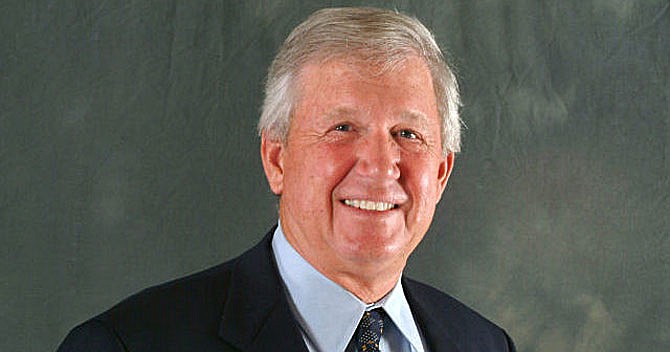Years ago, Fletcher Lamkin's life changed when he made a left turn instead of a right turn.
Today, the new leader of Westminster College has come full circle, returning to a job he loves.
"This is the last job I'll ever have," Lamkin said from his offices this week. "I'm looking at this as a mission I want to accomplish."
A retired brigadier general and former professor and dean of academics at the U.S. Military Academy at West Point, Lamkin served as president of Westminster from 2000-07. He officially returned as president, starting anew Nov. 15.
He replaces former President Benjamin Ola. Akande, who left his post this past summer.
"When given the opportunity to come back here and right the ship, I jumped on it," Lamkin said.
He recently came from a small college in West Virginia with 2,500 students and a $1.9 million surplus last year.
"We had the best student retention rate, the best success rate, best graduation rate," Lamkin said of West Virginia University-Parkersburg, his last posting. "Why would I leave that? Well, this place is worth it. This is a very special college with a special mission and well worth the effort to keep it afloat."
Lamkin's family has a strong tradition of serving in the U.S. Navy, but he instead attended and graduated from West Point with a bachelor of science degree. He also earned a master's in engineering from the University of California-Berkeley, and a doctorate at the University of Washington in Seattle. His military education includes completion of the Airborne and Ranger Schools, the Command and General Staff College, and the Naval War College, where he was a distinguished graduate and winner of the Mittendorf Award for Best Student Research.
Lamkin said his grandfather joined the Navy in 1902. His father, for whom he is named, graduated from the U.S. Naval Academy at in 1935, and served until 1965. Lamkin's daughter, a combat pilot, joined the Navy in 1993.
"I joined in 1964 and served until 2000," Lamkin said. "My (immediate) family served 110 years."
Lamkin spent 36 years in the U.S. Army, including a tour in Vietnam from 1966-67.
"Twenty-five of my classmates (from West Point) were killed in Vietnam," he added. "I knew them all by name."
Lamkin served in numerous command and staff positions in the Army, including battery command in Vietnam, battalion operations officer in Korea and battalion command in Germany. He taught engineering for a spell at West Point.
While sitting in a damp tent on a cold, rainy day in Germany, 10 days out from his last shower, Lamkin's field phone rang with an opportunity for a professorship at his old school. He thought about the creature comforts being offered, and returned to his alma mater on the Hudson River.
Back at West Point, Lamkin moved up the ladder, managing 55 faculty members as the head of the school's engineering department. By comparison, Westminster College has 53 faculty members.
He became vice dean and then the 10th dean of West Point, behind the superintendent and the commander. After five years, he moved on.
"It's probably one of the best jobs in the Army, to be the dean of West Point. But after five years, they ask you to hit the road," Lamkin said, laughing. "That led me to Westminster."
Seventeen years ago when Lamkin first saw Westminster, the college was in rough shape - financially and physically, he said.
"All this stuff in 2000 - it didn't look like this," he added. "Even the historic columns were crumbling."
On this visit, Lamkin said he drove around the half-circle road up and around the hill, coincidentally dubbed "Lamkin Drive." When he reached the bottom of the hill, he had a moment of reckoning.
"I could turn left and go back to the remainder of the interview, or turn right and go back to St. Louis," he said.
Lamkin turned left, and now, he's done it again.
New goals
While enrollment has dropped along with the college's endowment funding and donations, Lamkin said turning Westminster around is not a daunting job.
"Coming back the second time, clearly, the place is in better shape than in 2000," he said. "We've got great facilities. What's very strong is the student experience, their intellectual and character development. Westminster is equipping them with the experiential part of of becoming a leader."
Lamkin is also confident in the college's board of trustees, faculty and staff, and alumni.
"We have a strong board of trustees and passionate alumni, and this creates a positive picture of what can happen at this college," he said. "The challenge is to create a balanced budget, which is tied to new enrollments. We have to take care of our students and retain them."
Westminster College was built to accommodate 1,000-1,100 students, and currently has 750. It may take four years or so of retaining 85-90 percent of all students from freshmen through graduation - but Lamkin said that is what it will take to be successful.
"And I think that's doable," he added. "We had 640 students when I came (in 2000) and 950 when I left. That's the model, and it's doable, and we need to get back to it."
Lamkin said he also wants to develop online learning and graduate programs.
"These things need to be proposed," he said.
Upping annual alumni giving to 37 percent (of graduates) is another intent, which Lamkin said he's done before. Rob Crouse, the college's director of media and public relations, said Lamkin has the resources to make that happen.
"He's got these connections already with alumni, so he can hit the ground running there," Crouse said.
Being a private college means there's no state funding. Lamkin said the college's financial security depends on consistent tuition revenue and alumni gifts. He's already received a promise of $25,000 from one graduate, he said.
"I believe in the mission," Lamkin added. "A lot of good things are happening at the college already."

